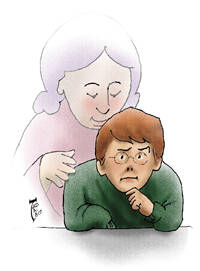Why Worry?
Shortly after Bobby McFerrin’s hit song “Don’t Worry, Be Happy” won the Grammy Award for Song of the Year in 1989, I was invited to Jamaica to give a workshop on the Gospel parables. Everywhere I went, the song was playing, and people were wearing T-shirts with the slogan, especially in the poorest barrios. I struggled to make sense of the irony: people living in grinding poverty with their smiling faces professing happiness.
The saying “Don’t worry, be happy” is attributed to Meher Baba, an Indian mystic and spiritual master (1894–1969), but it could just as well be derived from Jesus’ words in today’s Gospel. Three times Jesus insists that disciples not worry, whether about life, food or drink, the body or clothing; and he urges reliance on divine providence.
How this instruction is heard and taken to heart depends on one’s socioeconomic position. To those who have all they need to eat, drink, wear and sustain their bodily health, Jesus gives a warning not to center their efforts on accumulating more. Coupled with the introductory verses about serving God and not mammon, the Gospel admonishes those who have enough of life’s necessities not to give in to greedy desires that continue to escalate.
But what about those who are struggling just to survive, who truly worry about how they will feed their families? What good is it to voice assurances that God will provide? It would be especially pernicious if people mired in poverty hear “O you of little faith” (v. 30) as an accusation that their neediness flows from their lack of trust in God.
The key can be found in verse 33, in which Jesus instructs his disciples, “Seek first the kingdom of God and his righteousness, and all these things will be given you besides.” When the focus of one’s desires is on the right relations that characterize the reign of God, then those who have enough of life’s necessities are not fixated on a quest for more. Rather, they cooperate with God in providing for those in need. Those who are poor can let go their worries about survival, and those better off can be released from anxiety that derives from enslavement to possessions. These are the kinds of worries that Jesus invites disciples to let go. Worry on the part of those who are comfortable about others who are struggling can be a good and productive anxiety if it proves to be a catalyst to rectify unjust distribution of goods.
The Gospel does not advocate that disciples should be passive in the face of genuine need, simply tossing off a happy-go-lucky assurance that God will provide. It is more akin to Meher Baba’s fuller saying: “Do your best, then don’t worry; be happy in My love. I will help you.”
The help God provides is like that of a mother who could never forget her infant, as the first reading asserts. Likewise, the Gospel speaks of God making motherly provision by feeding and clothing not only her human children but wild flowers and birds and grasses of the field. Since God is both fatherly provider (v. 32), who sows and reaps, and motherly caregiver, who feeds and clothes, all that has come forth from the divine womb is tenderly cared for before their needs are even voiced. As children of the Creator, we too, tend and nurture all life, taking every measure possible to bring more fully to birth God’s kingdom and divine righteousness, letting go of worry and entrusting ourselves to the One who wills true happiness for all.
This article also appeared in print, under the headline “Why Worry?,” in the February 21, 2011, issue.








